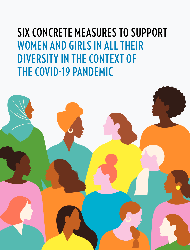 The coronavirus disease 2019 (COVID-19) pandemic is having devastating social and economic consequences worldwide. Yet the numbers of infections and deaths alone do not provide an accurate picture of the pandemic’s vast gendered impact. While the available data suggest that men experience higher rates of COVID-19-related deaths, women and girls are bearing a disproportionate burden of the larger impacts of the pandemic and states’ emergency responses.
The coronavirus disease 2019 (COVID-19) pandemic is having devastating social and economic consequences worldwide. Yet the numbers of infections and deaths alone do not provide an accurate picture of the pandemic’s vast gendered impact. While the available data suggest that men experience higher rates of COVID-19-related deaths, women and girls are bearing a disproportionate burden of the larger impacts of the pandemic and states’ emergency responses.
This guide is designed to provide recommendations to governments to confront the gendered and discriminatory impact of COVID-19. It highlights good practices; shares lessons learned from HIV and other past public health crises; provides strategic information; calls for engagement with communities most impacted by COVID-19; and sets forth concrete immediate and forward-looking recommendations for crisis responses, policy development and investment strategies. The guide presents six key areas of concern regarding the human rights of women and girls in all their diversity during the COVID-19 pandemic—differing needs of women and girls, particularly those most marginalized; access to essential health services; the neglected epidemic of gender-based violence against women and girls; misuse of criminal and punitive laws; adolescent girls’ and young women’s education, health and well-being; and valuing women’s work and making unpaid care work everybody’s work.
The gender-specific analysis and recommendations contained here are informed by valuable insight gained from the global HIV response recognizing that many of the same structural drivers of inequality in the HIV epidemic are the same as those driving inequality in the current COVID-19 pandemic. Neither COVID-19 nor HIV can be overcome without prioritizing the most marginalized populations, and recognizing that people have diverse experiences and needs. Along these lines, we should avoid adopting uniform responses that fail to account for local contexts and guarantee the human rights of everyone affected by the crisis and its response.